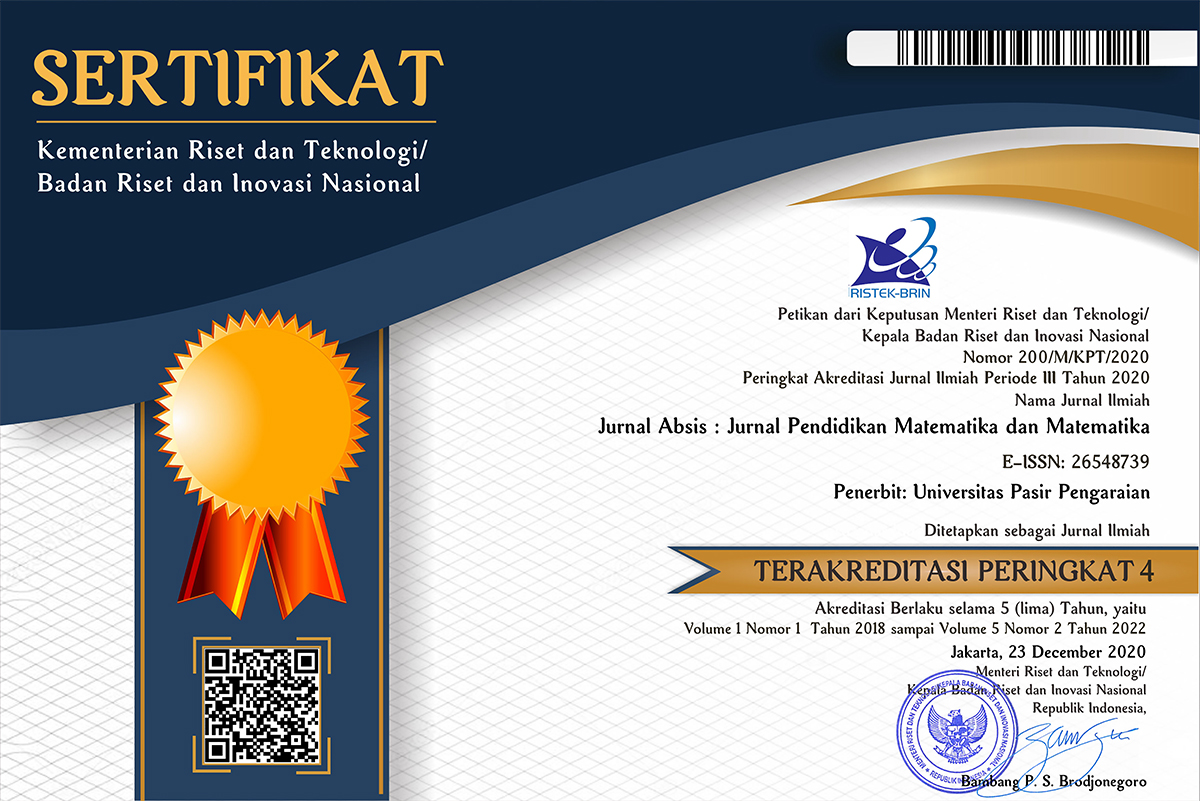Teori Perkembangan Piaget dan Vygotsky : Bagaimana Implikasinya dalam Pembelajaran Matematika Sekolah Dasar?
DOI:
https://doi.org/10.30606/absis.v5i1.1440Keywords:
Jean Piaget's Cognitive Development Theory, Vygotsky's Sociocultural Development Theory, Mathematics Learning, Literature ReviewAbstract
Mathematics is an important subject whose applications were widely used in life. However, many students have difficulty in learning mathematics, including elementary school students. This study aimed to examine the depth of Jean Piaget's cognitive development and Lev Vygotsky's sociocultural theory and their implication for mathematics learning at elementary school age. This study used a qualitative approach with the literature study method. Sources of data in the form of books, journals, and the results of previous research related to research problems. Data collection in this study was carried out using online searches. Data analysis was done by content analysis. The results of this study indicate that according to Piaget's theory of cognitive development, the thinking stage of students in elementary schools was generally in the concrete operational stage. So that the recommended mathematics learning was in the form of student-centered active learning such as discovery learning and contextual learning methods. Meanwhile, based on Vygotsky's sociocultural theory, he recommends cooperative and collaborative mathematics learning as well as optimizing the existence of scaffolding and social interaction in learning.
Downloads
References
Akkarya, B. R. (2017). Factors affecting difficulties in learning mathematics by mathematics learners. International Journal of Elementary Education, 6(2), 8-15.
Ali, H. H., & Jameel, H. T. (2016). Causes of poor performance in mathematics from teachers, parents and student’s perspective. American Scientific Research Journal for Engineering, Technology, and Sciences (ASRJETS), 15(1), 122-136.
Amir, Z., & Risnawati. (2015). Psikologi Pembelajaran Matematika. Yogyakarta: Aswaja Pressindo.
Berger, M. (2005). Vygotsky’s theory of concept formation and mathematics education. In Chick, H. L. & Vincent, J. L. (Eds.). Proceedings of the 29 th Conference of the International Group for the Psychology of Mathematics Education, Vol. 2, pp. 153-160. Melbourne: PME.
Blake, B., & Pope, T. (2008). Developmental psychology: incorporating Piaget’s and Vygotsky’s theories in classrooms. Journal of Cross-Disciplinary Perspectives in Education. 1(1), 59 – 67.
Das, K. (2020). Realistic mathematics & Vygotsky’s theories in mathematics education. Shanlax International Journal of Education, 9(1), 104-108. DOI: 10.34293/education.v9i1.3346.
Duncan, R. M. (1995). Piaget and Vygotsky revisited: Dialogue or assimilation? Developmental Review, 15, 458–472.
Flavell, J. H. (2000). Development of children's knowledge about the mental world. International Journal of Behavioral Development, 24 (1), 15-23. http://dx.doi.org/10.1080/016502500383421
Gafoor, K. A., & Kurukkan, A. (2015). Why high school students feel mathematics difficult? an exploration of affective beliefs. UGC Sponsored National Seminar on Pedagogy of Teacher Education- Trends and Challenges at Farook Training College, Kozhikode, Kerala.
Haryani, M., & Andriani, M. (2013). Pembelajaran Matematika SD/MI. Pekanbaru: Benteng Media.
Huang, Yu-Chia. (2021). Comparison and contrast of Piaget and Vygotsky's theories. Proceedings of the 7th International Conference on Humanities and Social Science Research (ICHSSR), Advances in Social Science, Education and Humanities Research, Vol 554, 28-32.
Indriana, Dina. (2011). Mengenal Ragam Gaya Pembelajaran Efektif. Yogyakarta: DivaPress.
Jamaris, M. (2006). Perkembangan dan Pengembangan Anak Usia Taman KanakKanak. Jakarta: PT Gramedia.
Jega, S. H., Muhammad, S., & Gwandu, Z. L. (2018). Causes of Students Mass Failure in Mathematics at Senior Secondary Schools Certificate Examination (SSCE) in Some Selected Secondary Schools in Kebbi State. International Journal of Education and Evaluation, 4(4), 12-25.
Jones, G.A. & Thornton, C.A. (1993). Vygotsky revisited: nurturing young chilfren’s understanding of number. Focus on Learning Problems in Mathematics, Vol. 15, 18–28.
Juwantara, R. A. (2019). Analisis teori perkembangan kognitif piaget pada tahap anak usia operasional konkret 7-12 tahun dalam pembelajaran matematika. Jurnal Ilmiah Pendidikan Guru Madrasah Ibtidaiyah, 9(1), 27- 34.
Kalhotra, S. K. (2013). A study of causes of failure in mathematics at high school stage. Academic Research International, 4(5), 588.
Khoiruzzadi, M., & Prasetya, T. (2021). Perkembangan kognitif dan implikasinya dalam dunia Pendidikan. Jurnal Madaniyah, 11(1), 1-14.
Langoban, M. A. (2020). What makes mathematics difficult as a subject for most students in higher education? International Journal of English and Education, 9(3), 214—220.
Lourenço, O. (2012). Piaget and Vygotsky: many resemblances, and a crucial difference. New Ideas in Psychology, 30, 281-295.
Mbugua, Z. K., Kibet, K., Muthaa, G. M., & Nkonke, G. R. (2012). Factors contributing to students’ poor performance in mathematics at Kenya certificate of secondary education in Kenya: A case of Baringo county, Kenya. American International Journal of Contemporary Research, 2(6), 87-91.
Mcleod, S. (2018). Jean Piaget's Theory of Cognitive Development. Simply Psychology, www.simplypsychology.org/piaget.html
Mcleod, S. (2020). Vygotsky's Sociocultural Theory. Simply Psychology, https://www.simplypsychology.org/vygotsky.html
Nabila, N. (2021). Konsep pembelajaran matematika sd berdasarkan teori kognitif Jean Piaget. (JKPD) Jurnal Kajian Pendidikan Dasar, 6(1), 69-79.
Nizar, M. (1988). Metode Penelitian. Jakarta: Ghalia Indonesia.
Nurfarhanah. (2012). Implikasi teori perkembangan kognitif dalam kegiatan belajar. Pedagogi: Jurnal Ilmiah Ilmu Pendidikan, XII(2), 12-17.
Nuryati & Darsinah. (2021). Implementasi teori perkembangan kognitif Jean Piaget dalam pembelajaran matematika di Sekolah Dasar. Jurnal Papeda, 3(2), 153-162.
Ojose, B. (2008). Applying Piaget’s theory of cognitive development to mathematics instruction. The Mathematics Educator, 18(1), 26–30.
Oakley, L. (2004). Cognitive Development. London: Routledge-Taylor & Francis Group.
Rusefendi, dkk. (1992). Materi Pokok Pendidikan Matematika 3. Jakarta: Debdikbud.
Piaget, J. (1936). Origins of intelligence in the child. London: Routledge & Kegan Paul.
Piaget, J. (1945). Play, dreams and imitation in childhood. London: Heinemann.
Piaget, J. (1957). Construction of reality in the child. London: Routledge & Kegan Paul.
Piaget, J., & Cook, M. T. (1952). The origins of intelligence in children. New York, NY: International University Press
Prakash, A.P., Jerlin, J. E., & Fernandes, J. B. (2014). A study on the causes for failures in mathematics by engineering students using CFRM model. Proceedings of the World Congress on Engineering 2014, Vol I, http://www.iaeng.org/publication/WCE2014/WCE2014_pp29-33.pdf.
Sa’ad, T. U., Adamu, A., & Sadiq, A. M. (2014). The causes of poor performance in mathematics among public senior secondary school students in Azare metropolis of Bauchi State, Nigeria. Journal of Research & Method in Education, 4(6), 32.
Tarteer, S., & Ismail, I. A. (2020). Investigating the possible reasons beyond students’ low achievement in mathematics in the tawjihi exam: a case study. British Journal of Education, 9(1), 20-41.
Wadsworth, B. J. (2004). Piaget's theory of cognitive and affective development: Foundations of constructivism. New York: Longman.
Walshaw, M. (2017). Understanding mathematical development through Vygotsky. Research in Mathematics Education, DOI: 10.1080/14794802.2017.1379728
Yeni, E. M., Wahyudin, & Herman, T. (2020). Difficulty analysis of Elementary School students in mathematical problem solving in solutions. International Journal of Scientific & Technology Research, 9(3), 44-47.
Zeidmane, A., & Rubina, T. (2017). Causes of failures in mathematics by engineering students at Latvia University of Agriculture. In The Proceedings of the International Scientific Conference Rural Environment, Education, Personality (REEP), Vol. 10, 220-227.
Zhou, M., & Brown, D. (Eds.). (2017). Educational Learning Theories. Dalton: Dalton Stage College








